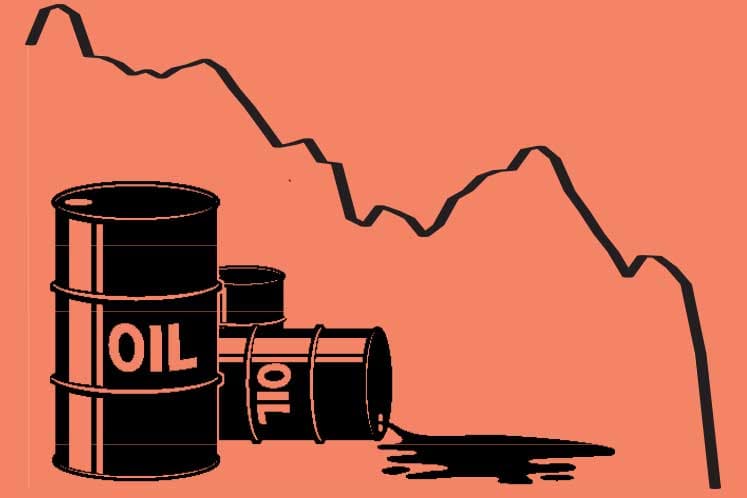
This article first appeared in The Edge Financial Daily on March 10, 2020
KUALA LUMPUR: Some RM77.8 billion worth of market capitalisation was wiped off from Bursa Malaysia-listed companies yesterday as investors took cue from the oil price crash, and lingering fears on Covid-19 virus as the spread outside of China continues to grow.
The FBM KLCI plunged into a sea of red in tandem with the global equity rout, amid ongoing fears of global economic slowdown. The local benchmark index closed 58.94 points or 3.97% lower at 1,424.16 points yesterday — the lowest since October 2011. Of the 30-component stocks, only the two glove makers — Top Glove Corp Bhd and Hartalega Holdings Bhd — as well as Nestle (Malaysia) Bhd closed in the green.
Bursa Malaysia saw some 6.66 billion shares, worth RM3.63 billion, traded. There were 1,139 losers versus barely 120 gainers, while 127 counters remained unchanged.
However, the KLCI, despite being down 3.97%, fared a little better then its regional peers, as Bangkok’s SET Index plunged 7.96% and Singapore slid 6.03% yesterday.
All indices on Bursa Malaysia, apart from the Bursa Malaysia Palm Oil Plantation Index which remained unchanged, were in negative territory. The worst hit was the Bursa Malaysia Energy Index, which closed 25.39% or 256.97 points down to 754.95, no thanks to oil prices that nosedived to the US$30 (RM126.30) per barrel level — the lowest since February 2016.
Investors took their cue from Saudi Arabia’s plan to drive prices lower to hurt its competitors, after a failed negotiation with Opec+ led by Russia for a bigger supply cut to lift prices last week. At the time of writing, Brent crude oil price was at US$35.48 per barrel.
The ringgit also depreciated against the greenback to close at 4.2172 at 6pm yesterday, from 4.1727 last Friday.
RHB Investment Bank Bhd regional equity research head Alexander Chia told The Edge Financial Daily that the collapse in oil prices is the “third whammy” to hit the Malaysian market over the last six weeks, after the Covid-19 outbreak and political uncertainty.
“Risks are still weighted on the downside in the near term as all three negative factors are still playing out without near-term resolution in sight,” he added, noting that near-term risks are firmly on the downside.
Some of the catalysts for the market would be Opec+ renegotiation, containment of Covid-19 spread, and easing of political tension.
TA Investment Management Bhd chief investment officer Choo Swee Kee concurred, saying he expects further downside risk for Bursa Malaysia and other regional indices.
He added that he sees no quick resolution on both Covid-19 and oil price slump.
“The spread of Covid-19 outside of China has been alarming in recent weeks. Extrapolating from China’s experience on lockdown and assuming a similar measure is imposed on the countries affected, the impact on the global economy is expected to be deeper and faster than the US-China trade war.
“Opec+ has been artificially supporting oil prices for the past one year by limiting supply while the US has been taking advantage of good oil prices by producing more. Hence, Opec+ is frustrated,” Choo said.
Choo opined that the main worry is on economic growth.
“If economic growth slows down drastically or maybe even [slip into] a recession, all countries will likely be affected regardless of whether you will benefit from lower or higher oil prices,” he said.
An analyst, speaking on condition of anonymity, described the global market situation as “bad”, saying that the KLCI is experiencing a knee-jerk reaction following the crash in oil prices.
“We are certainly in a bear market situation,” the analyst said, adding that the main concern at this point is essentially the Covid-19 outbreak.
“So unless they can control the situation, or if the situation is under control, then we could see some rebound, as this is what impacts the global economy and corporate earnings,” the analyst said.
After yesterday’s steep fall, the analyst said there could be a little hope for rebound or what is called “dead cat bounce”.
“It also really depends on what will happen in Wall Street tonight,” said the analyst. Should there be a rebound, there could be an impetus for a quick recovery in the Asian markets, including Bursa Malaysia,” the analyst added.
Other than the collapse in oil prices and the impact from Covid-19, Affin Hwang Investment Bank Bhd deputy group managing director Yip Kit Weng said nearer home, with the next parliamentary sitting delayed till May 18, political uncertainty will also be a major pushback for the local market.
“Any risk of a sovereign rating downgrade, gross domestic product contraction or corporate earnings growth collapse could possibly push the KLCI to the -3SD (standard deviation) level or near 1,365,” said Yip.
For now, the research firm maintains the end-2020 KLCI projection of 1,540 based on 17 times 2020 market earnings per share, or -1SD below its five-year mean, he added.
Related Article: